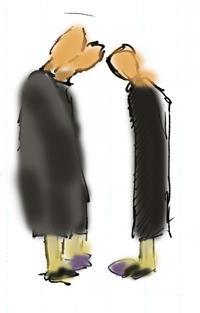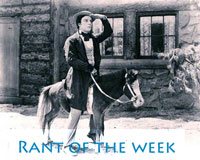
Sophie is not a Jew, of course: she is a Pole. In fact, it is at times
suggested that she is an anti-Semite, and Nathan certainly accuses her of
it.
Hollywood simplifies. Reality is complex. Read
this document about the remarkable experiences of Eleonore Hodys.
I respect "Sophie's Choice" for leaving intact the complexities, and thus
giving us a taste of the astonishing ability of real events to confound our
expectations.

Pointless illustration by Bill.
As I said, I basically like "Sophie's Choice", but if you are a bright young
author out there and you're writing your first great book, please resist the
temptation to have your characters fall over themselves praising your
talent, as Styron does in "Sophie's Choice" (Stingo is obviously a stand-in
for Styron as a young man in New York); Sophie and Nathan, of course, think
he is brilliant.
* * *
The mystery of Meryl
Streep: it's a great performance... that constantly calls
attention to itself. It's hard to describe what is meant exactly by
that phrase-- "calls attention to itself" -- but I know it when I see it.
(Dustin Hoffman -- in "Rain Man" for example-- is another great practitioner of the art of calling
attention to himself being a character.) She's so good in other
respects, it's almost possible to completely ignore it. But there are
scenes when Streep is so much the actor being a brilliant actor that
you almost forget the character: all you see is technique. Brilliant
technique, but still technique. It's so obvious in her
performance that I could never believe in the relationship with Nathan--
there doesn't seem to be room in her technique for him, let alone a real passion.
The greatest flaw in actors like Streep (Ryan Gosling is another) is that
they intuitively demand that every scene be absorbed into their performance.
I always felt that any actor could have played Nathan-- all you had to do
was stand there an let Streep paint the colours of her day on your canvas.
It's the kind of technique that wins awards.
Streep is a very, very good actress at times, but one of the least generous
actors I've ever seen. By generous, I mean giving the other
actors and the film-maker space within which to do their own work. I
mean studying the other actors to see what they're doing and how you can
contribute to the overall effect, rather than just call attention to
yourself.
Kate Winslet is the opposite of Streep-- look at her in
"Heavenly Creatures" or even "Titanic"--: not as
accomplished as Streep, but far more generous, and often more convincing.
She makes Melanie Lynskey, her co-star, look brilliant.
Michael Caine,
Robert Duvall, Amy Adams-- all generous. Rachel McAdams. Meg
Ryan in "When Harry met Sally" gave Crystal room to entertain.
Barbra Streisand and Robin
Williams and especially Jim Carrey: utterly selfish. Every scene they are in
is always only about them.
Next time you're at a movie, ask yourself if the actor you are watching
intently on the screen is contributing to the impact of the other actors.
And one more note: according to Wiki, Streep obtained an unauthorized copy
of the script before it went into production and went to Alan Pakula's house
and threw herself onto the ground and begged for the role. Smart girl: she
knew it would win her an award because, a) it has nazis, b) it has an accent. [added 2019-11-20]
"Almost no one knows -- including Sophie and Stingo -- that Nathan is schizophrenic." From the Wikipedia entry on "Sophie's Choice".
The question is, if no one knows that Nathan is a schizophrenic,
how does
anyone know he is a schizophrenic?
First, I do want to make it clear that I think "Sophie's Choice" is a fine
book by a fine author. But I find this little episode silly.
We're supposed to give knowing nods to each other, aren't we? Ahhhh!
He's a schizophrenic! No wonder. We were fooled because he was
self-medicating.
In fact, Nathan has just been labeled. Nobody has to prove that he
is anything now: he has a label. That is sufficient. A label is
what you use when you can't be troubled to find any specific facts or
evidence for your belief. [In an unusually contrived episode of West
Wing, "Noel", Josh Lyman is similarly glibly labeled as "PTSD".]
So how would you know if it's true-- if you were
a character in this fiction. How would you know if Nathan is a
schizophrenic? Author William Styron needs the label for dramatic
tension so he glosses over the question.
Is there some tattoo somewhere
on his body that tells the discerning acquaintance: schizophrenic?
No-- some person with a degree on his wall, who may be a genius or an
idiot-- we'll never know, for both of them have an equal chance of getting
the degree (the Nazi party was full of degrees)-- this person, by
virtue of society's capitulation to the pseudo-sciences, has decreed: Nathan
is a schizophrenic.
You can lock him up now. Anything he says in his own defense is to
be regarded as further proof of his insanity. The more justly he
becomes angry at your attempts to pigeon-hole him, the crazier he is.
But no one may question the sanity of the man with the diploma on his wall.
He has science on his side. He had the audacity to give the
first label, thereby shifting the burden of proof on the labeled.
Nathan is deprived of the presumption of sanity.
If only it was science, or
something, anything more credible. In my view, most of was passes for
"psychology" is a religion in drag; it's a religion that tries to hide it's
assumptions behind a veil of mangled statistics and manipulative language
that always manages to give a plausible answer to the wrong question.
There is no greater arrogance in the entire world than to sit in judgment of
another person's sanity. Anyone who would do this should get his head
examined.
And if
only Nathan had had the foresight to get his diploma first-- he, also, was a
genius-- he could have decreed his brother as delusional instead of the
other way around. Just imagine the scene in which the brother informs
Stingo that Nathan is insane. Imagine, if you will, that Stingo has
been told in advance by Nathan that the brother is delusional: the
scene would work perfectly, and the brother would come off as no less
creepy, least of all for inviting a perfect stranger to secretly report to
him on the private activities of his brother.
So the lesson is this: be the first to get your diploma, so that you can
deem all those who offend your prurient sense of good order and propriety
insane.
The power of labels. Stingo
is too naive to actually question whether a label means anything. He
assumes that psychiatrists have some magical powers that allow them reduce
the sum of a person's behaviors to a syndrome which, like all good
labels-- including the star of David-- shall subsequently determine the
context in which all other behaviors are regarded. Nathan's rage at an
unjust world-- a world with lynch mobs, or HUAC, or the inquisition, or Salem's
magistrates, or a KGB -- around every corner-- is the result, say the doctors, of his
schizophrenia.
Or maybe it's the only sane reaction to a world gone mad. To a
world that shows no signs of learning from it's mistakes. From a
world that still embraces the passions of the mob.
[Upon re-reading this,
it has occurred to me that someone might say, well, would you rather Nathan
be allowed to do whatever he wants, including harm himself or others?
That's always the rejoinder, isn't it? If you dare to challenge social
orthodoxy, then you're responsible for bad things that happen, even though
these people never take responsibility for the failures of their own
ministrations. So, just to clarify for the easily confused:
no, I'm not advocating that people do nothing. I'm just saying that we
often use labels to avoid grappling with complexity, and, in many cases, to
justify drastic actions that end up doing more harm than good.]
All Contents Copyright
© Bill Van Dyk
2010 All Rights Reserved
Font: Verdana




